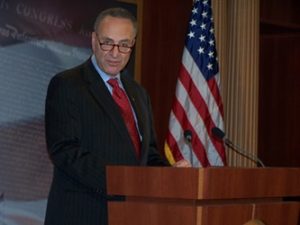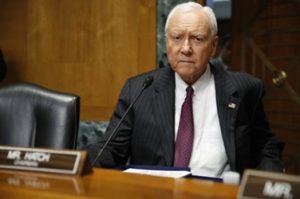In response to the introduction of the Sports Wagering Market Integrity Act of 2018 by senior U.S. Senators Charles “Chuck” Schumer (D-NY) (pictured below, right) and Orrin Hatch (R-UT) (pictured below, left) on Wednesday, Washington, D.C. trade group, the American Gaming Association (AGA), released a statement opposing the federal government’s overreach on sports betting.
Senior Vice President of Public Affairs for the AGA, Sara Slane, said…
“This bill is the epitome of a solution in search of a problem, representing an unprecedented and inappropriate expansion of federal involvement in the gaming industry, which is currently one of the most strictly regulated in the country.

“Across the country, nearly 4,000 dedicated public servants already regulate all forms of gaming, including sports wagering, with more than $500 million committed to ensuring the integrity of commercial casinos’ operations and $822 million spent on regulation of tribal gaming in 2015 alone. These state and tribal regulators have decades of experience effectively overseeing gaming operations within their jurisdictions.
“mandatory use of official league data”
“Additional areas this bill seeks to address – including the mandatory use of official league data and the creation of a national sports wagering clearinghouse – can, and should, be decided by marketplace negotiations between private businesses and cooperative agreements among jurisdictions. In the mere six months since the U.S. Supreme Court paved the way for legal, regulated sports betting, significant developments on both of these fronts have already occurred without any federal involvement.
“will continue to be a non-starter”
“While federal regulation of sports betting will continue to be a non-starter for the gaming industry, we appreciate the sponsors’ recognition that more must be done to curb illegal sports betting operations, which continue to pose the biggest impediment to the success of a legal market that will benefit and protect consumers, sports leagues and casino operators alike.”
The bi-partisan legislation would reportedly bring federal oversight to the recently-deregulated sports betting industry and require operators to solely utilize data officially licensed or supplied by sports leagues.

Integrity fees not addressed:
The Sports Wagering Market Integrity Act of 2018 does not address any so-called “integrity fees” that would be payable to the pro sports leagues from sports gambling revenues.
Sports betting landscape post PASPA:
Since the May 14, 2018, invalidation by the United States Supreme Court of the Professional and Amateur Sports Protection Act (PASPA) of 1992, sports betting has been legalized in New Jersey, West Virginia, Rhode Island, Mississippi and Pennsylvania. The 1992 law granted immunity to Nevada, which reported record-breaking figures for sports betting in September, Delaware, Oregon, and Montana, which had previously allowed sports betting inside their borders.
While New Mexico hasn’t passed legislation authorizing sports betting, it became the fifth state to offer sports betting following the repeal of PASPA when under an existing Class III gaming compact the Pueblo of Santa Ana tribe opened a sportsbook at its Santa Ana Star Casino & Hotel.
Sports betting has also been legalized in Arkansas, as voters in the state passed Issue 4, a measure to amend the state constitution to license casinos in four counties and also to allow sports betting.
New York and Connecticut have put partial laws in place pending further action, while a further five states including Kentucky, Missouri, Ohio, Tennessee and Virginia have bills pre-filed for the 2019 legislative session.

Politics and debate likely:
The bill is reportedly seen as a first step in what will likely be a lengthy process, and it won’t pass in this session of Congress, which has less than two weeks remaining.
After the new Congress begins its session in January 2019, the 101-page bill will have to be formally reintroduced.
Miller appointed new CEO:
Last week, the AGA’s Board of Directors named Bill Miller as its next president and chief executive officer. Miller will lead the $261 billion gaming industry effective January 14, 2019. He succeeds Geoff Freeman, who left the casino sector trade lobby group to become the new president and CEO for the Grocery Manufacturers Association (GMA) on August 1, 2018.



